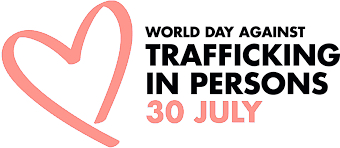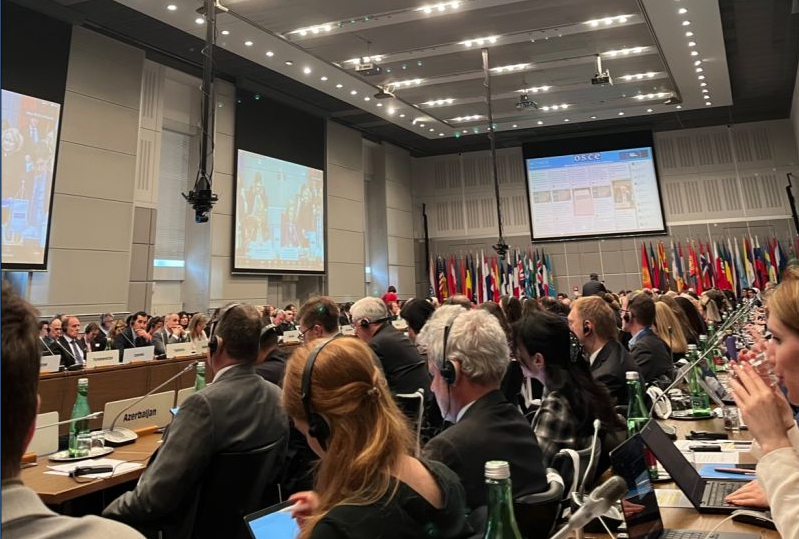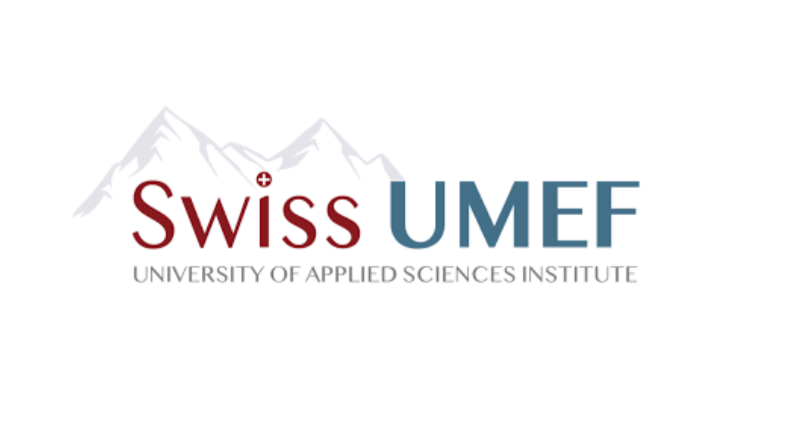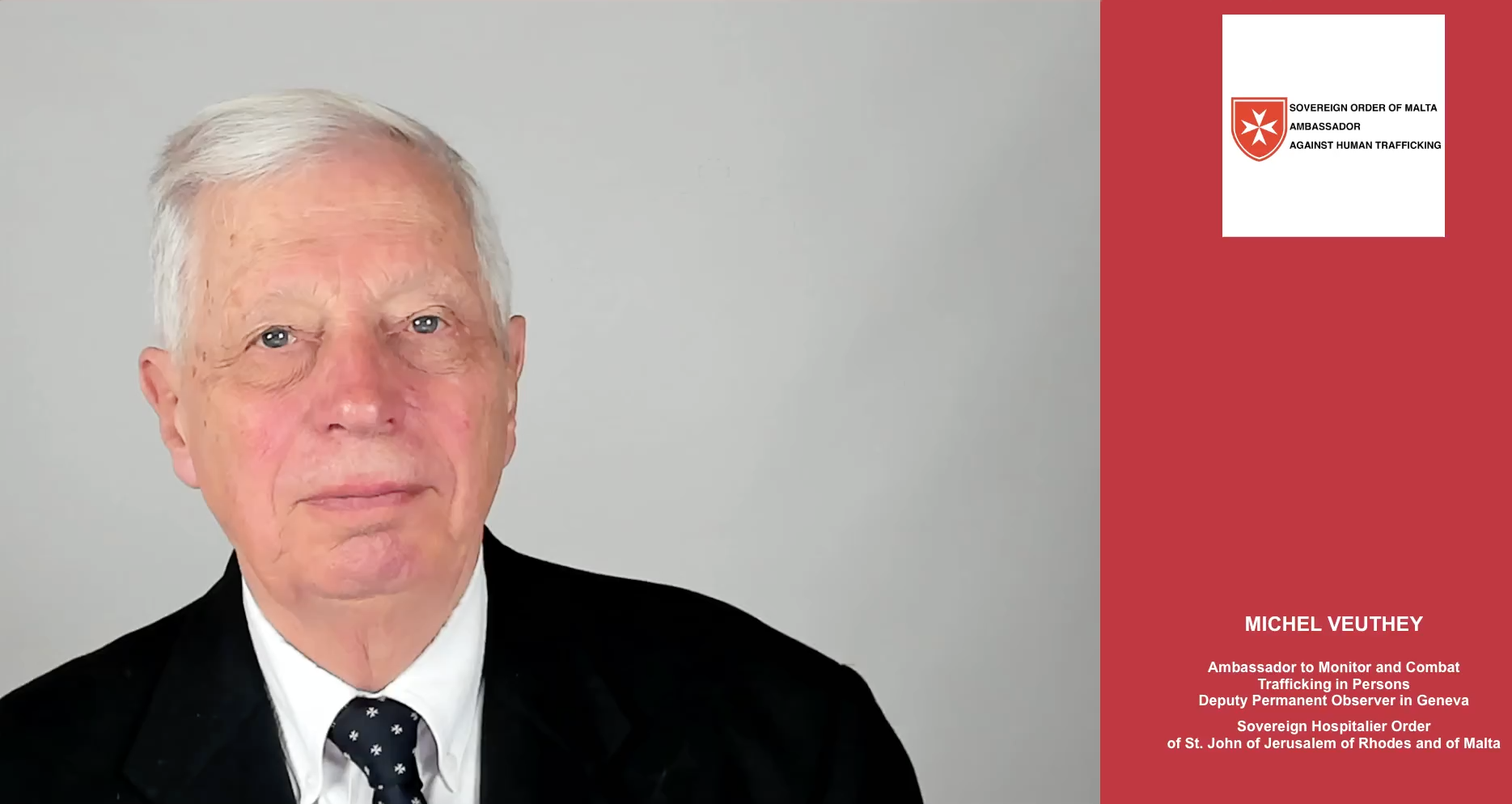World Day Against Trafficking in Persons
30 July 2022
Statement by Michel Veuthey
The Sovereign Order of Malta has appointed in 2017 two Ambassadors tasked with combating human trafficking. Based in Geneva, Michel Veuthey (Ambassador to Monitor and Combat Trafficking in Persons) and based in Africa, Romain Champierre de Villeneuve (Ambassador at-large for Africa), they strengthen the commitment of the Order of Malta in preventing the trafficking of humans and protecting the victims, with projects both at local and diplomatic level.
At each session of the Human Rights Council in Geneva, as well Vienna and New York, the Order of Malta makes interventions on various forms of human trafficking or contemporary slavery: forced labor, forced marriages and motherhood, sale of children, pornography, forced organ harvesting. The Order of Malta is also increasing partnerships with universities in France, Italy, Switzerland and the USA.
With this massive influx of people, the Order of Malta is raising attention on the risk of refugees falling victims of human traffickers. To this end its Polish embassy has issued an alert containing safety rules for refugees which is being distributed along the main exit routes in Ukrainian, English and Polish. Malteser International is coordinating the global effort of the Sovereign Order of Malta, whose associations and relief and volunteer corps are on the ground to assist the refugees.
The Sovereign Order of Malta would like to underline the important role of religious leaders and religious congregations in the protection and assistance to victims of human trafficking, often in cooperation with former victims and survivors (see list in appendix).
Regarding global responsibility, as Pope Francis said: “Together with the social responsibility of businesses, there is also the social responsibility of consumers. Every person ought to have the awareness that purchasing is always a moral – and not simply an economic – act.”
Today’s measures to prosecute traffickers and to protect and shelter victims are notoriously insufficient and inefficient. Legal instruments and mechanisms exist at the domestic, regional, and global level, but they are not up to the challenge of the increasing scourge of modern trafficking.
These legal mechanisms only prosecute a handful of criminals and offer insufficient numbers of shelters and services to victims. https://adlaudatosi.org/international-prosecution-of-human-trafficking-what-can-be-done/: indeed, the number of criminal convictions related to human trafficking is extremely low: 1 in 2,154 cases of slavery results in a conviction – a rate of 0.047%.
On the root causes, the Order of Malta shares the view that the demand for trafficking should be criminalized, taking into account the different forms of exploitation, slave labor or sexual exploitation. The fight against human trafficking, particularly related to demand, must be carried out through a multidisciplinary, multidimensional, and coordinated approach between the different actors.
Concerning online exploitation, the criminalization of consumers who purchase images or even the piloting of abuse sessions on minors and women must be a priority. Existing international, regional and national political and legal instruments must be fully implemented but we must consider new instruments adapted to the abuse of new technologies. We need a completely new way of thinking about modern slavery.
We have to reconceptualize human rights in the workplace and build a new economic model
that advantages businesses respecting human rights. Decent work is at the opposite end of the same spectrum as modern slavery. Indeed, what we need to do is promote a culture of respect for human rights in the workplace.
Demand comes from unrestricted dominion over human beings and Creation, without any respect neither for human life and dignity (See the 2020 “Fratelli Tutti” Encyclical Letter) nor for integral ecology (See Ch. 4 of the 2015 “Laudato si’ Encyclical Letter). Today’s economic system too often allows the primacy of objects over humans and the priority of capital over labor, technology as an end and not as a means, and technology being abused to create demand.
It is not enough to provide human trafficking survivors with just legal protection, we must also provide them with physical, psychological and religious protection. It is important to give them a safe space, to return to a normal life, accompanied by all the medical and social services which they may need.
States must also abolish existing laws prosecuting the victims of trafficking and go after the traffickers instead.
Governments must provide victims with a safe space, access to help from authorities, and not be in danger of deportation, receiving fines or being wrongfully imprisoned.
All countries should advocate for the “Nordic Model”, which was introduced in Sweden in 1999, and was the world’s first law to recognize prostitution as violence against women and a violation of human rights. It criminalizes the purchase of commercial sex and offers the exploited an exit strategy.
Demand is at the core of all types of human trafficking. Article 9.5 of the UN Trafficking in Persons Protocol (Palermo Protocol) calls on States to develop legal and policy measures that will work to end the demand that leads to human trafficking in all its forms.
Let’s conclude with these two questions:
– Firstly, how could religious values of solidarity and respect for human life and dignity be better used to stop contemporary forms of slavery? How could Faith-based organizations receive more support to protect and rehabilitate victims?
– Secondly, how could we collectively promote hard and soft legal instruments monitoring and criminalizing the demand for all forms of human trafficking: slave labor, sexual exploitation, forced organ transplantations, sold and stolen babies, and forced surrogacy motherhood, as demand is the root cause of contemporary slavery?
Appendix:
Let us highlight, among others, the following networks of religious organizations active on behalf of victims of human trafficking:
- The Santa Marta Group, a global partnership with representatives of the Catholic Church, police agencies and international organizations from 30 countries
- The International Catholic Migration Commission (ICMC) protects and serves uprooted people, including refugees, asylum-seekers, internally displaced people, victims of human trafficking, and migrants — regardless of faith, race, ethnicity or nationality.
- The Talitha Kum Network, the International Network of Consecrated Life Against Human Trafficking, with Members from 92 countries
- The COATNET (Caritas), a global network of Christian organizations working to combat human trafficking and assisting survivors of modern slavery with 45 Christian (Catholic, Anglican, and Orthodox) organizations in 39 countries
- The S. Catholic Sisters Against Human Trafficking, a collaborative, faith-based national network that offers education, supports access to survivor services, and engages in advocacy to eradicate modern-day slavery
- Religious in Europe Networking Against Trafficking and Exploitation (RENATE),
a network of 139 organizations working in 31 countries - Jesuit Refugee Services (JRS), working in 52 countries
- Association Comunità Papa Giovanni XXIII, in Italy, with over 60 family homes outside of Italy
- Africa Network against Human Trafficking (ANHAT)
- Australian Catholic Religious Against Trafficking in Humans (ACRATH)
- Australian Anti-Slavery Network (ACAN), facilitated by the Anti-Slavery Taskforce of the Archdiocese of Sydney (CAS)
- SOLWODI (Solidarity with Women in Distress), active in Germany, Austria, Rumania, Hungary and Africa.
- Congregation of Our Lady of Charity of the Good Shepherd (RGS), partner of a series of webinars on human trafficking
- Sisters of the Daughters of Charity of St. Vincent de Paul
- Sisters of Saint Louis, with the Bakhita House in Lagos (Nigeria), led by Sr. Patricia Ebegbulem.




